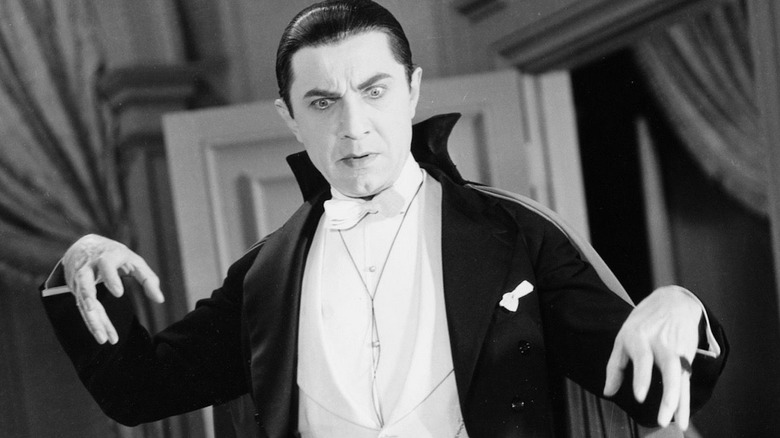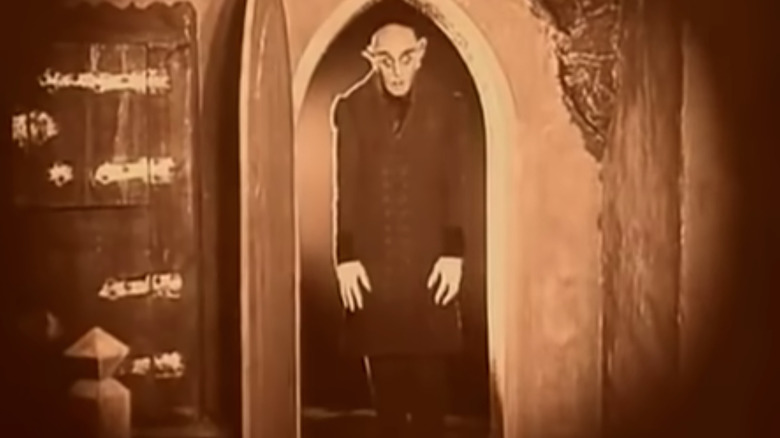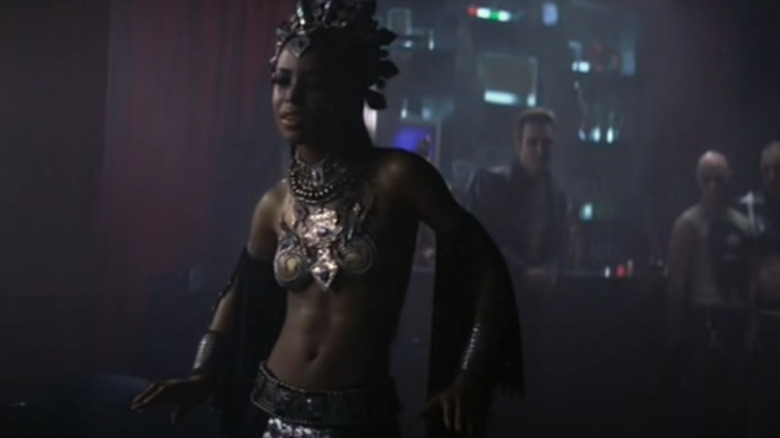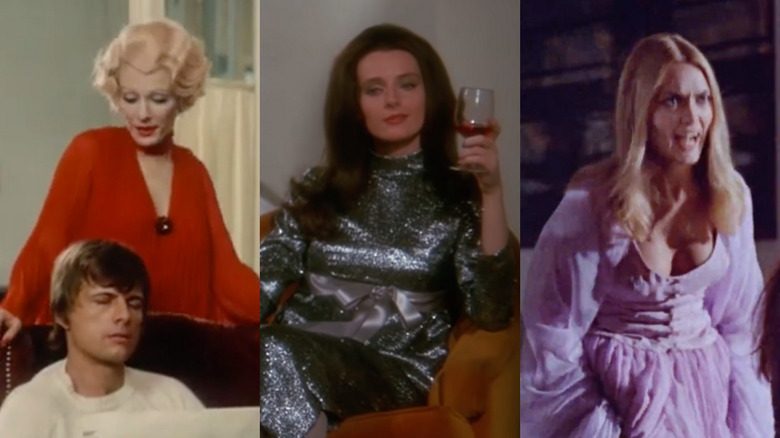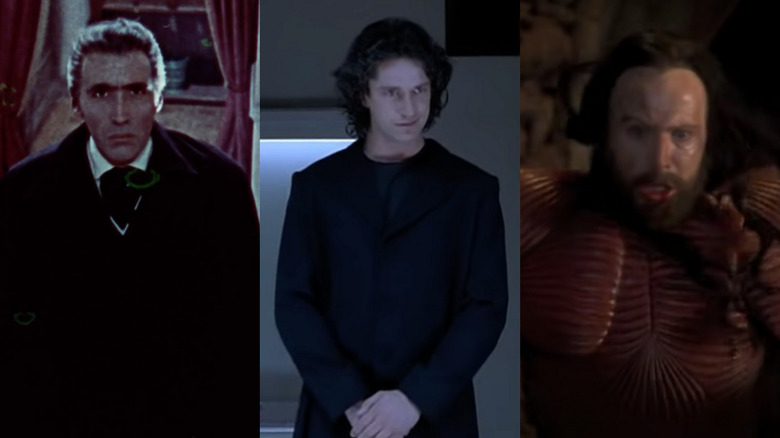Why Can't Dracula Dress For S***? A Look At Our Worst-Dressed Movie Monster
Count Dracula is, and always has been, a sex symbol. All those horny love letters women sent to Bela Lugosi prove it, but if you need more, look to the symbolism: A man sneaking into your room at night to do a little necking and turn you into an (ahem) creature of the night. Looking at things from a more modern perspective, the man owns his own house — a castle, no less — which is more than most Millennials swiping through dating apps on the hunt for someone to split life expenses with can possibly hope for. Hell, I'd go for Drac without the real estate, as long as he had good dental benefits I could glom onto. (The question of whether vampires go to the dentist is one for another time.)
And yet, there's a side of Dracula that makes him sub-optimal as a mate ... and no, it's not all the murder. (OK, it's also the murder.) Dracula, it must be said, cannot dress for s***, and it's time we talked about it.
It's Been a Problem Since the Start
Dracula had his feature debut in 1922's silent film classic "Nosferatu," where he was played by Max Schreck. The name of Schreck's creepy vampire was "Count Orlok," true, but the film's similarities to Bram Stoker's "Dracula" were marked enough for Stoker's estate to successfully sue producer Albin Grau for copyright infringement. And thus, Dracula's pop culture bow established a part of his character that would, by and large, remain relatively intact throughout the following near-century: when it comes to fashion, Drac is one basic b****.
Orlok's military coat and straight-legged jeans combo (and, okay, the coat is serviceable) was supplanted in 1931's "Dracula" by Dracula's now-iconic outfit: a black suit, white shirt combo with (the piece de resistance) a cape, expertly wrangled for maximum drama by Bela Lugosi. (Wear the cape. Never let the cape wear you.) The duds? Fine. A solid six out of ten. They look tailored. They also look boring — if you're an immortal creature some hundreds, potentially thousands of years old, would you not have gotten bored enough at some point to invest in a personal menswear style that's actually interesting?
If Dracula were just Some Dude™, that would be one thing,–but he is, forever and always, the poster boy of vampires. If you have the mantle of history (in addition to a cape) on your shoulders, one would think you'd take a little responsibility for looking your best. Instead, Dracula rests on his laurels. He's the equivalent of every man with the audacity to wear a boring old tuxedo to, of all things, the Met Gala. Dracula pulls the most expected outfit from his closet — he probably has dozens of the same thing, all lined up in a row — and thinks he's put in enough effort to deserve his own vampire wife harem. No.
Other Vampires Got It Right
Drac's cinematic progeny have succeeded where he failed. Through the decades, costume designers have expressed the twin exotic and eroticism of vampires through clothing, taking the trends of the era and giving them a little bump towards the fashion-forward extreme. Think the Hot-Topic-on-steroids aesthetic favored by the vampires in the "Underworld" franchise; Aaliyah's abs-bearing metal bikini top in Queen of the Damned; and cravats for days in "Interview with the Vampire." Blade: half the vampire that Dracula is, but twice the fashion sense.
Or, to take it out of the '90s/early aughts: Bill Paxton slashed a man's throat with his spurs in Kathryn Bigelow's "Near Dark." In 1935's "Mark of the Vampire" — like Dracula, directed by Tod Browning and starring Bela Lugosi — Luna brought face. "Blacula" lead Mamuwalde: on the edge of dull, but the ascot pushes it to the right side of history. And "The Lost Boys": what do I even need to say?
Lesbian Vampires Lead the Way
And then there are the lesbians.
The lesbian vampires, that is, star of a sub-genre of horror films that thrived through the '70s, with directors (and auteurs of borderline softcore) Jesús Franco and Jean Rollin leading the charge. There's never been a more fashionable vampire than Delphine Seyrig in Harry Kümel's "Daughters of Darkness: — but Sapphic bloodsuckers from films like "Vampyros Lesbos," "The Blood Spattered Bride," "The Velvet Vampire," and more give her a run for her money. In 1936's "Dracula's Daughter" (in which the lesbianism is, if not outright stated, at least heavily implied), Countess Marya Zaleska (Gloria Holden) brings something to the vampire fashion fold that dear ol' dad couldn't be bothered with: multiple changes of clothing. Just because you're undead doesn't mean you have to smell undead.
Meanwhile, there's Drac. In "Buffy the Vampire Slayer" — a gold mine of eye-catching (if usually in a bad way) '90s trends — he looks like a dollar store Criss Angel. Gerard Butler sunk his teeth into the role in "Dracula 2000," where he was helped along in his route to badassness by... uh... a black duster he found on the clearance rack at Ann Taylor? In 1979, Frank Langella mixed things up by adding a wrap shirt to Dracula's closet, at least. Even the great Christopher Lee couldn't make the basic black suit/black cape combo look all that compelling.
Dracula's Fashion Through the Ages
There is one exception, and it's a big one. "Bram Stoker's Dracula," directed by Francis Ford Coppola, takes every shred of sartorial spice that could have been spread across nearly a century and packs it into one movie. Gary Oldman proves Dracula's most fashionable incarnation, with costume designer Eiko Ishioka kitting him out in an anatomical-looking suit of armor, a dove gray suit with (gasp) actual detail-work, and a pretty swaggy loungewear ensemble. If anything, the existence of Oldman's Dracula wardrobe proves my point: it took Eiko Ishioka, one of the most impressive, innovative, and downright brilliant costume designers ever in the game ("The Fall," "The Cell," "Mirror Mirror") to make Dracula dress like anything other than a complete putz.
In short, Dracula: Your clothes suck.
